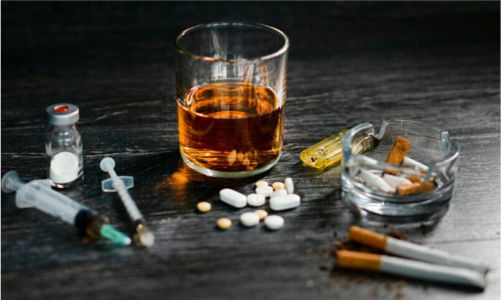What Is Addiction?
Addiction is a complex condition, a brain disease that is manifested by compulsive substance use despite harmful consequences. People with addiction (severe substance use disorder) have an intense focus on using a certain substance(s), such as alcohol or drugs, to the point that it takes over their life. They keep using alcohol or a drug even when they know it will cause problems. Yet a number of effective treatments are available and people can recover from addiction and lead normal, productive lives.
Common addictive substances are :
Alcohol, Cannabis(Bhang, Ganja,Charas),
LSD and other hallucinogens, Inhalants, such as paint thinners and glue, Opioid pain killers, such as codeine and oxycodone, heroin
Sedatives, hypnotics, and anxiolytics,
Cocaine, methamphetamine and other stimulants, Tobacco.
People with a substance use disorder have distorted thinking, behavior, and body functions. Changes in the brain’s wiring are what cause people to have intense cravings for the drug and make it hard to stop using the drug. Brain imaging studies show changes in the areas of the brain that relate to judgment, decision making, learning, memory, and behavior control.
These substances can cause harmful changes in how the brain functions. These changes can last long after the immediate effects of the drug — intoxication. Intoxication is the intense pleasure, calm, increased senses or a high caused by the drug. Intoxication symptoms are different for each substance.
Over time people with addiction build up a tolerance, meaning they need larger amounts to feel the effect. People begin taking drugs for a variety of reasons, including:
to feel good — the feeling of pleasure, “high”
to feel better — e.g., relieve stress
to do better — improve performance
curiosity and peer pressure
People with addictive disorders may be aware of their problem, but be unable to stop it even if they want to. The addiction may cause health problems as well as problems at work and with family members and friends. The misuse of drugs and alcohol is the leading cause of preventable illnesses and premature death.
Symptoms of substance use disorder are grouped into four categories:
1)Impaired control: a craving or strong urge to use the substance; desire or failed attempts to cut down or control substance use
2)Social problems: substance use causes failure to complete major tasks at work, school or home; social, work or leisure activities are given up or cut back because of substance use
3)Risky use: substance is used in risky settings; continued use despite known problems
4)Drug effects: tolerance (need for larger amounts to get the same effect); withdrawal symptoms (different for each substance)
Many people experience both mental illness and addiction. The mental illness may be present before the addiction. Or the addiction may trigger or make a mental disorder worse.
Treatment
Effective treatments for addiction are available.
The first step on the road to recovery is recognition of the problem. The recovery process can be hindered when a person denies having a problem and lacks understanding about substance misuse and addiction. The intervention of concerned friends and family often prompts treatment.
A health professional can conduct a formal assessment of symptoms to see if a substance use disorder exists. Even if the problem seems severe, most people with a substance use disorder can benefit from treatment. Unfortunately, many people who could benefit from treatment don’t receive help.
Because addiction affects many aspects of a person’s life, multiple types of treatment are often required. For most, a combination of medication and individual or group therapy is most effective. Treatment approaches that address an individual’s situation and any co-occurring medical, psychiatric and social problems can lead to sustained recovery.
Medications are used to control drug cravings and relieve severe symptoms of withdrawal. Therapy can help addicted individuals understand their behavior and motivations, develop higher self-esteem, cope with stress and address other mental health problems.
Many people find self-help groups for individuals (Alcoholics Anonymous, Narcotics Anonymous) as well as their family members (Al-Anon or Nar-Anon Family Groups) useful.
How to Help a Friend or Family Member
Learn all you can about alcohol and drug misuse and addiction.
Speak up and offer your support: talk to the person and express your concerns, and offer your help and support like your willingness to go with them and get help. Like any other chronic diseases, the earlier it is treated, the better is the outcome.
Express love and concern: don’t wait for the person to “hit bottom.” You may have to deal with excuses, denial or anger. Be prepared to respond with specific examples of behavior that has you worried.
Don’t expect the person to stop without help: you have heard it before – promises to cut down, stop – but, it doesn’t work. Treatment, support, and new coping skills are needed to overcome addiction to alcohol and drugs.
Support recovery as an ongoing process: once your loved one is receiving treatment, or going to meetings, remain involved. Continue to show that you are concerned about his/her successful long-term recovery.
Some things you don’t want to do:
Don’t lecture, threaten, bribe, preach or moralize.
Avoid emotional appeals that may only increase feelings of guilt and the compulsion to drink or use other drugs.
Don’t cover up, lie or make excuses for his/her behavior.
Don’t assume their responsibilities: taking over their responsibilities protects them from the consequences of their behavior.
Don’t argue when using: avoid arguing with the person when they are using alcohol or drugs; at that point he/she can’t have a rational conversation.Don’t feel guilty or responsible for their behavior; it’s not your fault.


